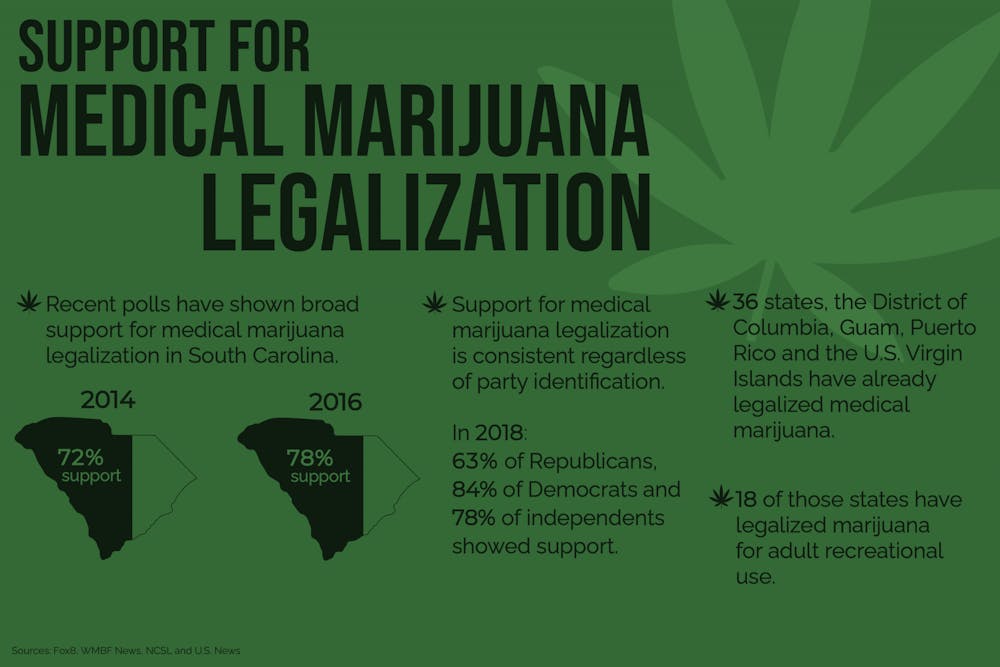For the last eight years, South Carolina Sen. Tom Davis has been working to legalize medical marijuana in South Carolina. During a press conference last Wednesday at the Statehouse, Davis said he expects this is the year that it will finally happen with the SC Compassionate Care Act.
The Republican from Beaufort said he has been assured that the bill will reach a vote in the Senate and the House.
"I fully expect, that given those commitments, that we are going to be standing here in three or four months celebrating a bill signing with Governor McMaster," Davis said.
The SC Compassionate Care Act's aim is to create a well-regulated medical marijuana program that would allow those with glaucoma, autism, PTSD and other serious illnesses to safely use medical marijuana when recommended by their physicians.
During Davis' press conference, several testimonials were given by people suffering from conditions they said could be treated with medical marijuana.
Gary Hess, the executive director of the Veterans Alliance for Holistic Alternatives, was one of the people who spoke about their personal experiences.
Hess spoke about his experience as a veteran and the health conditions he received after being wounded in combat. Hess said the painkillers prescribed to him by the VA actually hurt his mental health more than they helped his physical health.
"I was inadequate. I was a failure. I honestly thought that taking my own life was logically the best answer," Hess said.
Hess said in 2017 he gained access to medical marijuana and his life has since changed for the better.
"The truth is that the medical efficacy of this plant cannot be denied," Hess said.
These testimonials speak to the political will that has been growing in South Carolina to legalize medical marijuana. Past polls have shown support for medical marijuana legislation at approximately 70%.
This support is not just along party lines either. A 2018 Benchmark Research poll showed support for medical marijuana legalization in South Carolina at 63% among Republicans, 84% among Democrats and 78% among independents.
In another sign of support for marijuana, Nancy Mace, a Republican U.S. Rep. from Charleston, recently revealed her own legislation to decriminalize marijuana at the federal level.
Joshua Meyer-Gutbrod, a USC political science professor, explained the disconnect between public opinion and inaction at the state level.
"Once policies are in place, constituents get used to those policies and so, especially for older generations of Americans, they may view legalization of marijuana as a move away from policies that they're comfortable with," Meyer-Gutbrod said.
Meyer-Gutbrod said the poll numbers showing large support for medical marijuana may be misleading because a disproportionate number of respondents likely came from urban population centers where people are likely to be more liberal.
The majority of the state legislature represents rural districts, so that may not translate to support from the entire state.
Meyer-Gutbrod also said that there are many institutional gatekeeping mechanisms in the state legislature to keep bills from being voted on. He said Republicans may have been avoiding a vote before as to not show division within the party with some Republican lawmakers still not fully on board.
"What you can do as a party is you can essentially just keep these things from hitting the floor, so nobody is forced to make an up-and-down vote," Meyer-Gutbrod said.
However, despite all of these reasons, Meyer-Gutbrod still sides with Davis in expecting this legislation to pass and become law.
"Based on public support, I think once it hits the floor of the House and Senate, once it's past that gatekeeping, I think they're going to have a lot of trouble not passing it," Meyer-Gutbrod said. "I would be very surprised if it doesn't go through this session."

